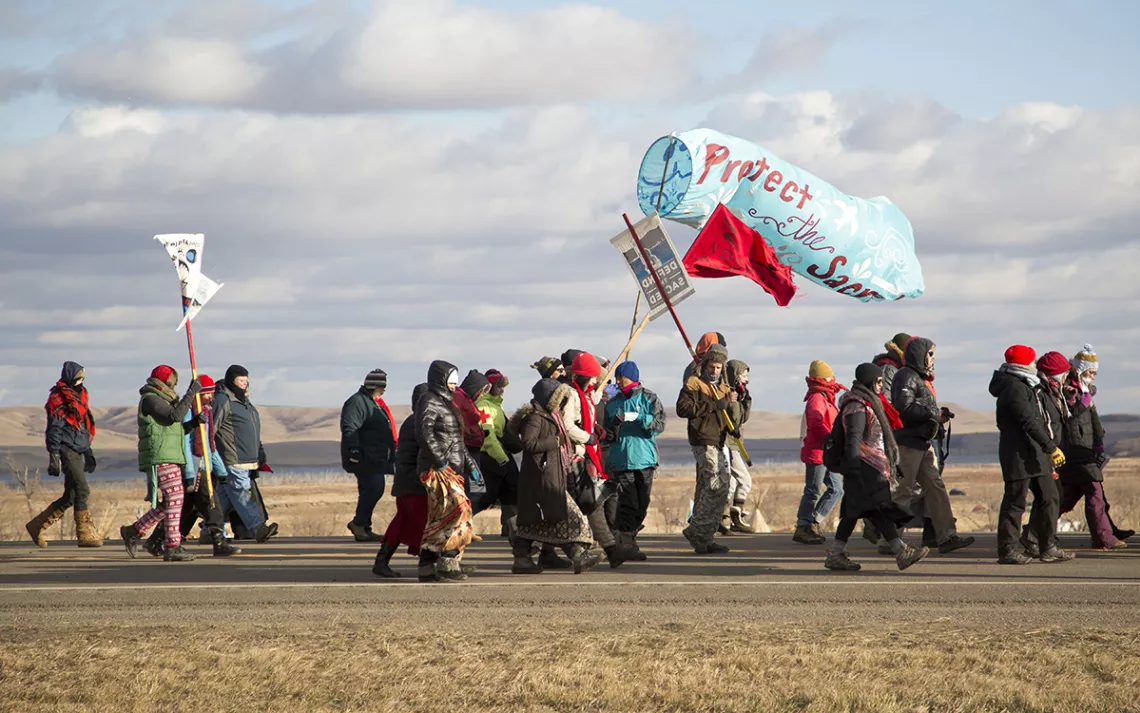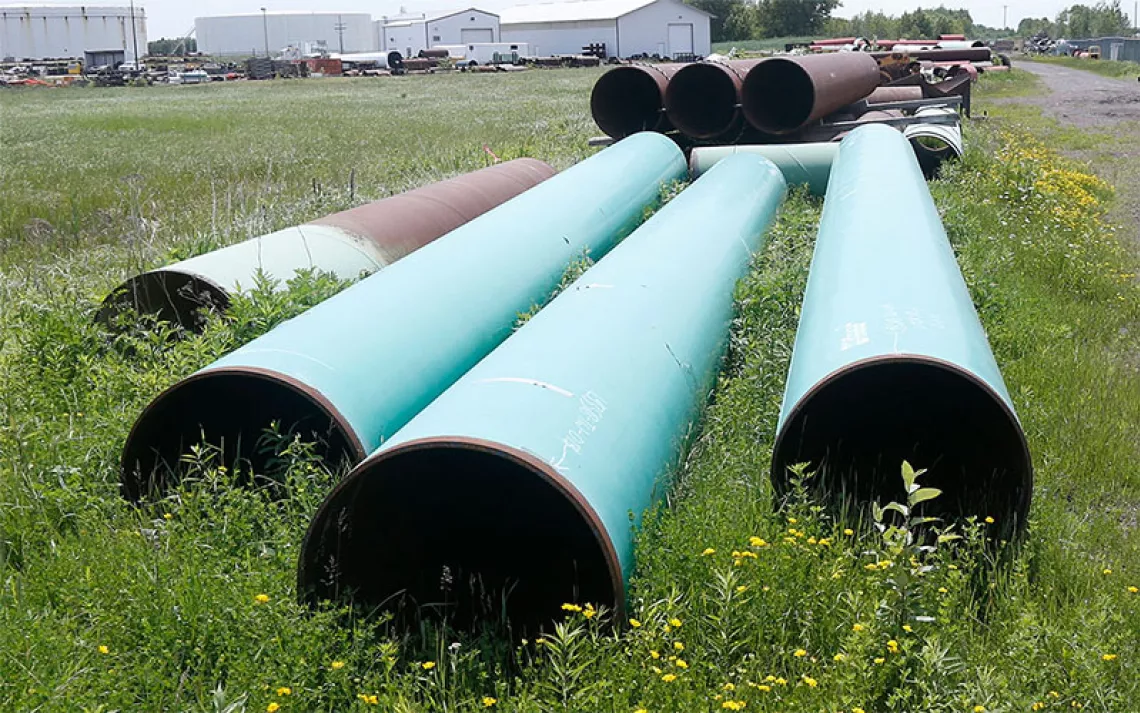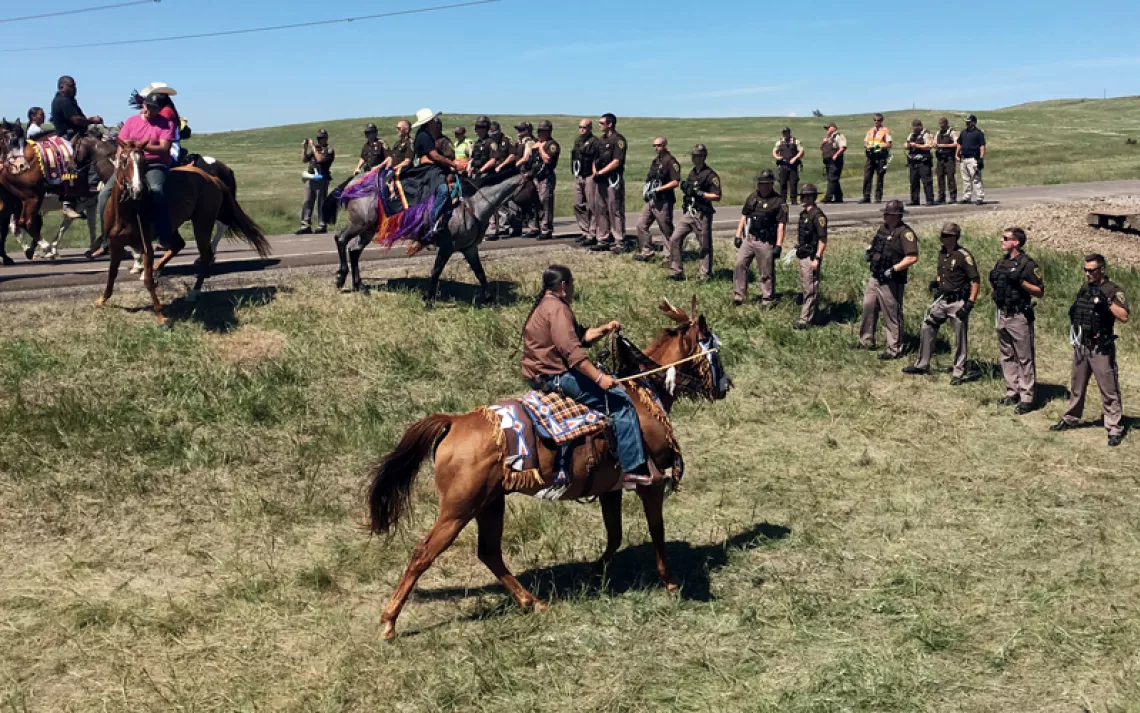President Biden, Do Not Cross This Thin Red Line
The White House’s inaction on the Dakota Access Pipeline is cowardly

Opponents of the Dakota Access Pipeline on November 18, 2016. | Photo by Terray Sylvester / VWPics via AP Images
The opinions expressed here are solely those of the writer and do not necessarily reflect the official position of the Sierra Club.
During a meeting with Native American leaders earlier this year, Biden administration officials promised that they wanted to “get it right” with regards to the contested Dakota Access Pipeline. And during his first week in office, President Biden signed an executive order pledging to “respect Tribal sovereignty.” Then came the April 9 decision by the Army Corps of Engineers to allow oil to keep flowing through the illegally operating pipeline.
This is definitely not “getting it right,” nor is it respectful of tribal sovereignty. Rather, it is a clear indication of a quivering fear of Big Oil. And it furthers our descent into climate emergency, all while continuing to spit on tribal interests.
On April 1, 2021—just after the fifth anniversary of the opening of the first resistance camps to the Dakota Access Pipeline at the Sacred Stone Camp—the original youth runners who ran to Washington, DC, back in 2016 to bring awareness to the DAPL fight converged in DC again. This time, they wanted to draw attention to the continuing fight against DAPL and lift up the struggle against Enbridge’s Line 3 pipeline in Minnesota. Once again, Indigenous people are standing up to protect water, protect wild rice, protect cultural resources for Indigenous tribes, and advance the fight against climate change. To date, at least 100 people have been arrested in lockdowns of Line 3 construction equipment.
The youths who gathered in DC, many of whom were just teenagers when the DAPL fight started, put their bodies back on the line. During a protest in front of the Army Corp of Engineers office, they brought a 300-foot-long symbolic black snake to the Biden administration's front door. They also delivered to the administration a petition signed by 400,000 people calling for a halt to Line 3 construction and a halt to the Dakota Access Pipeline’s operations.
The administration didn’t listen. Just over a week later, the Army Corps of Engineers decided not to shut down Dakota Access—even though a major permit to cross under the Missouri River has been vacated and the pipeline is operating illegally. Yes, it is an illegally operating pipeline. While the Army Corps has said it wishes to follow the rule of law, it is instead focused on conducting an environmental impact statement ordered by the federal courts.
“In the absence of a valid permit, the pipeline is going to keep operating, exposing the tribe and its members to the risk of disaster while the Army Corps studies what those risks are and what a spill would mean,” Jan Hasselman, a lawyer representing the Standing Rock Sioux Tribe, said when the decision was announced. “It’s not right.”
What happened to the idea of the rule of law? It’s standard practice for fossil fuel corporations to breeze through state and federal permitting processes and, if they are later found to be in the wrong, to pay a nominal fine and go about business as usual. However, when it comes to tribal sovereignty and the free, prior, and informed consent required by international human rights treaties, US officials always seem willing to bend the rule of law.
But those of us who are resisting these fossil fuel projects that are detrimental to the climate, to tribal sovereignty, and to the water we all need to survive—we won’t bend. These fights put Indigenous communities first because we are often the ones that face the disastrous impacts of these projects first. From losing land along the coasts to fire dangers and drought in the breadbasket of so-called America, Indigenous communities have been screaming that we collectively must stop the insanity and listen to Native voices and do what is right for all people. We must make a hard, red line to stop this madness.
I myself have been fighting the Dakota Access Pipeline for a long time. During the 2015–16 resistance to the pipeline, I lived for 10 months on the land along the Cannonball and Missouri River confluence. I have hauled water, chopped wood, and lived through minus-40-degree Fahrenheit temperatures during blizzard conditions. I, along with so many other Indigenous compatriots, faced off with militarized police on the grassland prairies out in the middle of nowhere. At that time, we warned the world that what we faced out there in the Dakotas, the country as a whole would eventually face, since racism is at the heart of these oppressive systems of colonialism, capitalism, greed. Supposedly capitalism works in the name of progress. But what is progress? We must make a great reset to not only save the climate but to also save all people from our own destructive ways.
Today—Monday, April 19—a federal court reconvenes to determine if DAPL will be shut down while the environmental impact study is in process. Part of that process will include consultation with area tribes. It’s important to remember that the only thing the federal government must do is consult. But consultation is not consent. We are pushing the administration to obtain free, prior, and informed consent from Indigenous communities for all fossil fuel projects. That is, consultation and input from Indigenous communities before infrastructure or other projects start. That means giving information straight to Indigenous communities—not a paternalistic approach of coming in and doing what is in the best interest of corporations.
We have always said no to the Dakota Access Pipeline—just as we are saying no to Line 3 and for years said no to the Keystone XL Pipeline. Biden did revoke the key cross-border permit for Keystone XL, effectively shuttering that zombie pipeline. That was a good thing, but we won’t take one without the other. It’s time for the Biden administration to make good on its promises to “get it right” and respect tribal sovereignty.
Our future is at stake. All our futures.
 The Magazine of The Sierra Club
The Magazine of The Sierra Club



